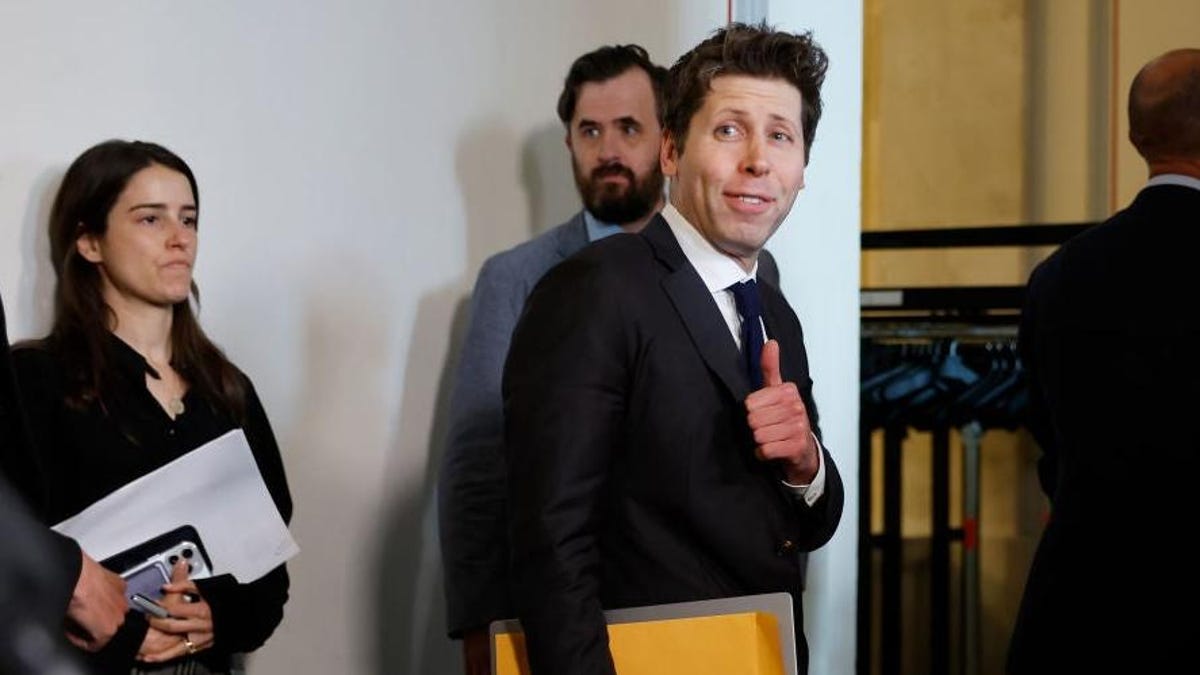
Where do we start with Sam Altman’s Worldcoin? The OpenAI CEO’s startup is building a new cryptocurrency. Worldcoin is also part of Altman’s disquieting plan to capture all of the world’s money with AI and then “redistribute this wealth to the people.” (Literally). And, because you log in by scanning your eyeball, Worldcoin is simultaneously trying to become the internet’s default identity verification system. Those eyeball scans are done using one of the company’s “Orb” devices, sci-fi-inspired metallic spheres with special cameras on the front. These scans are performed by Worldcoin’s trained “Orb Operators.” On Sunday, the Worldcoin Foundation announced that going forward, most of its Orb Operators will be paid in its own, made-up cryptocurrency, Worldcoin. For some reason, the blog post on the company’s website about this news is blocked in the United States. Wonders never cease.
The Worldcoin Foundation is based in the Cayman Islands, a haven for corporations that don’t want to pay taxes. It’s less than six months old, but already the organization is steeped in controversy and unusual business moves. Just a month after the cryptocurrency’s global release, its price dropped 44% when Kenyan authorities launched an investigation into the company’s data practices. Earlier this year, reports suggested Worldcoin was facilitating a black market for iris scan biometric data in China.
Advertisement
When Worldcoin launched in the US, I hopped on the subway in New York City and made a pilgrimage to offer my eyeballs to the crypto gods. At the time, Altman was taking a victory lap over his new venture, boasting about the “crazy lines around the world” filled with people waiting for a turn with the Orb. Aside from a PR representative and the Orb Operator, there were exactly two other people waiting to get their eye scans. The PR rep assured me they had a steady stream of would-be users at other locations in the city.
Advertisement
In other parts of the world, Worldcoin rewards new users with a few dollars worth of cryptocurrency for signing up. That isn’t the case in the US. Thanks to the uncertain regulatory environment, the company says Worldcoin tokens are “not intended to be available to people in the United States.” So I didn’t get anything in exchange for my eyeballs — aside from an account with a service that I, an American, am not allowed to use in any meaningful way.
Advertisement
In the Manhattan co-working space where Worldcoin set up shop, a cheerful Orb Operator who looked to be in his early 20s answered my questions about the process (off the record, per the PR person’s instructions). Presumably, he didn’t get any Worldcoin either.
Until recently, the company paid its Orb Operators with something a little closer to real money. Their salary came in the form of “US Dollar Coin” (USDC). USDC is a “stablecoin” with a consistent price that’s more or less tied to the US dollar, as the name suggests. Stablecoins are supposed to encourage people to participate in the joys of the blockchain without the risk of losing money through other notoriously volatile cryptocurrencies, such as Bitcoin.
Advertisement
Over the weekend, Worldcoin published an announcement on its blog titled “An update: Circulating supply evolution and renewal of market maker loan agreements.” If that string of words is meaningful to you, please fill me in. The blog post celebrates the company for giving away 34 million free Worldcoins to 800,000 users. The company goes on to say it plans to adjust the number of Worldcoins in circulation to manipulate the market, presumably in a good way.
Towards the bottom of the announcement, the blog post reads that until now, its Orb operators were paid in USDC ”during a transitional phase after launch.” Now, that transitional phase is ending, and soon “Worldcoin Operators will instead receive rewards” in the form of Worldcoin. Rewards are a funny way to describe paychecks, but hey, what do I know? It goes on to say, in italics, that Worldcoin “tokens are not available to people or companies who are residents of, or are located, incorporated or have a registered agent in, the United States or certain other restricted territories.”
Advertisement
I heard about the news on a crypto website called The Block. But when I tried to go read this announcement for myself, I found myself stonewalled. The URL redirected me to a page that said “This content is not available in your region.” My go-to solution for this kind of problem is the Internet Archive’s Wayback Machine, which saves copies of webpages for posterity. You can find Worldcoin’s blog post preserved by the Wayback Machine here—unless Worldcoin asks the Internet Archive to take it down, in which case we’ll update this article with our own copy.
I asked a few other people if they were seeing the same thing. Gizmodo editor James Whitbrook, who lives in the UK, said the page was blocked for him as well. (Like the US, Worldcoin is also unavailable in the UK, where regulators are looking into the company.) A friend who lives in France told me he was able to read Worldcoin’s blog post just fine.
Advertisement
It appears that Worldcoin is blocking this announcement for anyone who lives in a country where the cryptocurrency is unavailable. Why? I couldn’t tell you. I reached out to Worldcoin and the friendly but serious PR person who escorted me on the day I got my eyes scanned. The company confirmed that the website is “geofenced,” but didn’t offer an explanation or immediately respond to follow-up questions.
News is news, whether it applies to you or not. You’re reading about it right now, in fact. But for some reason, Worldcoin doesn’t want you to hear these details if you live in the US, at least not directly from the company. It’s a little ironic, I must say, given Worldcoin’s slogan: “For every human.”
Services Marketplace – Listings, Bookings & Reviews